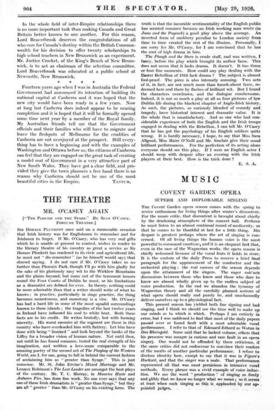MUSIC
COVENT GARDEN OPERA
SUPERB AND DEPLORABLE SINGING
THE Covent Garden opera season comes with the spring to revive enthusiasm for living things after winter's discontent: For the music critic, that discontent is brought about chiefly by the deadening atmosphere of the concert hall. Perforce he must listen to an almost continual round of mediocrity, so that he comes to be thankful at last for a little thing. His despair is greatest perhaps where the art of singing is coll.,- cerned. Of all living things the human voice is the most powerful to command emotion°, and-it is an eloquent feet that, even in the case of the Wagnerian works, the opera season is chiefly welcomed because of the vocal feats it holds in store.. It is the custom of the daily Press to reserve a brief final.
paragraph for the appr'aisement of the conductor and the orchestral playing ; the real success of- the season depends upon the attainment of the singers. The eager entr'acte discussions between those who know and those who dare to know are almost wholly given up to the endless subject of voice production. In the end we abandon the tyranny of Wagnerian theory and all the carefully planned notions of what opera should really and purely be, and unashamedly deliver ourselves up to a physiological fact.
This present season has yielded both fine signing and bad singing, and I think we should use the time well to make up our minds as to which is which. Perhaps I am entirely in error, but I was saddened to-find that most of the daily papers passed over or found fault with a most admirable vocal performance. I refer to that of Edouard .Erhard as Wotan in
Das -Mei ngold Some said that he lacked •volume, others that his presence was meagre (a curious and rare fault in an opera
singer). One would not be offended by these criticisms, if the same critics did not endeavour to convince their readers of the merits of another particular performance. I refuse to
disclose identity here, except to say that it was in Figaro's Hochzeit, and that the singer was a male. That performance represented all that was most pernicious in intensive vocal methods. Every phrase was a vivid example of voice induc- tion. We use the word " production '.' of singing so freely and glibly that we know no longer what we mean; so it seems at least when- such sinning as this is applauded> by our ap. pointed judges.•- It was the more surprising that this performance was not universally condemned, seeing that it stood side by side with the very essence of fine singing in two other performances. Lotte Lehmann sang the aria at the beginning of her scene in the third act with such fullness of tone and such dignity of phrasing' that it was impossible not to realize in what state of musical grace she was abiding. Obviously her atonement with physical means had been made long ago. Elisabeth Schumann (" Susanna ") also gave an abundance of good pleasure. Here was a congruency of thought, action and utterance. Her recitative-singing defeated all the absurdity of the process, and made it appear the most natural expression possible ; so much so that between the acts I found myself conversing with a friend in a kind of recitative intonation and expecting him to give an abrupt dominant tonic reply. Elisabeth Schumann, better than any of the others, carried the natural contours of the phrases over the punctuations of the German language. Greatly as I admired Delia Reiz-
ihardt ( Cherubino and especially her acting, I felt that her phrasing was too obviously conditioned by the special 'problem of enunciation, so that her first aria, for example, became rather measured and deliberate.
But these three singers have revealed to us how good and joyful a thing it is to sing with an open throat, and we shall AO well to profit by the revelation to declare war on all manner of vocal perversion and restriction.











































 Previous page
Previous page